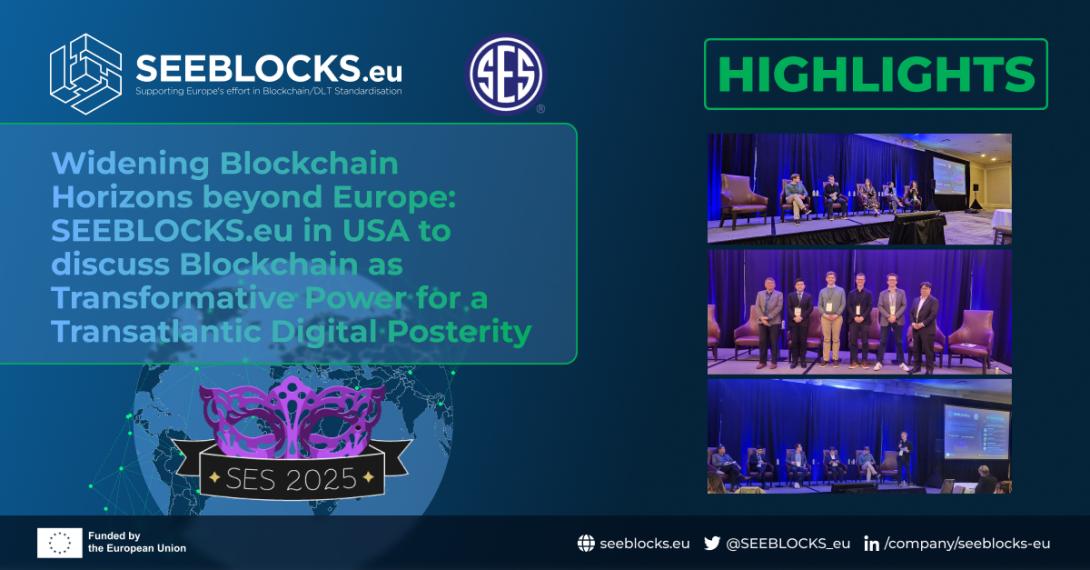Widening Blockchain Horizons beyond Europe: SEEBLOCKS.eu in USA to discuss Blockchain as Transformative Power for a Transatlantic Digital Posterity
24 April 2025

SEEBLOCKS.eu was proud to organise the “Blockchain: a Transformative Power for a Transatlantic Digital Posterity” workshop, composed by two panel sessions at the annual conference of the Society for Standardisation Professionals, SES 2025, which took place in New Orleans, USA on May 19-21, 2025, with over 150 participants.
The sessions were organised in the firm belief that the USA & Europe, working together, can set global standards for innovation, regulation, and security in blockchain and shape the future of Web3, decentralised finance and digital assets. There are many reasons that collaboration on Blockchain between the USA and Europe is so important, such as global leadership and stability, harmonised regulations, enhanced security and fraud prevention, and a unified transatlantic strategy to ensure that democratic nations lead the blockchain revolution.
The first panel was titled "Blockchain in Europe and USA - Two sides of the same coin?" The panel was predicated on the premise that the USA and Europe are partners strongly committed to driving the digital transformation and cooperating on new technologies based on their shared democratic values. But which respective paths are they currently taking? The panel sought to focus on the question: What are the main values and needs in blockchain standardisation for the USA and Europe right now?
To bring the United States of America perspective, the panel counted on inputs from Carole House and Sarah Milby. Carole House (from the Blockchain Governance Initiative Network and CEO of Techtonic Partners LLC in Washington) emphasised the critical need for "safe competitiveness" through robust regulation and standards, highlighting the importance of standards and regulation in safeguarding nations from international threats and supporting global financial security.
Watch Carole House interview
Sarah Milby of the Blockchain Association in Washington, D.C. focused on the delicate balance between consumer protection and market integrity. She urged for standardised disclosures and safeguards that would not stifle innovation. A key point raised by Milby was the protection of open-source development. She advocated for liability protections for developers whose code might be misused by bad actors, ensuring that innovation is not hindered by potential legal repercussions.
Focusing on Europe, Moritz Böhmecke-Schwafert, from the German Federal Blockchain Association (“Bundesblock”) and a member of ISO/TC 307, discussed the impact of regulations like MiCA (Markets in Crypto-Assets). He stated that these regulations provide consumer protection, increase trust in the sector, enhance market stability, and offer legal clarity. He also noted that MiCA aims to be an evolving framework, adapting to the dynamic nature of the blockchain and crypto sectors
Watch Moritz interview
Nick Ferguson, Senior ICT Standardisation Lead at SEEBLOCKS.eu coordinator Trust-IT in Pisa, Italy, emphasized the role of EU regulation in driving global standards, particularly through new legislative instruments like the Cyber Resilience Act (CRA). He described how EU-funded projects are providing vital support for SMEs and open-source developers to actively shape these standards through projects such as Cyberstand.eu, SEEBLOCKS.eu, and StandICT.eu. Moreover, he highlighted HSbooster.eu and EDU4Standards.eu as efforts to engage academia and future professionals.
After looking into today’s European and USA realities, it was time to look into the future. The second panel discussion titled "Fostering Joint Innovation in Blockchain Standardization for Transatlantic Digital Posterity" looked at collaboration opportunities between both regions. The panel explored crucial aspects of blockchain technology evolution, including the effects of regulation on innovation but also the promise for innovative uses of blockchain in new areas such as environmental impact analysis and control. Beyond the exploration of technical aspects, the panel sought to answer the question: How can the USA and Europe move forward together now, collaborating to promote the creation of global blockchain standards that allow a stronger unified digital future and support the evolution of the digital landscape?
Shin'ichiro Matsuo of Georgetown University and Virginia Tech, as well as the co-chair of the Blockchain Governance Initiative Network (BGIN), emphasised the need for a global perspective on blockchain standards, advocating for harmonisation that considers the goals of all nations, especially in consumer protection and financial activities.
Watch Shin'ichiro Matsuo interview
Moritz Böhmecke-Schwafert (already a veteran of our first panel discussion) came onboard once again to argue that standards only appear to decelerate innovation when people are not educated about them. He then proposed creating a global centre for blockchain education, involving initiatives from both the US and the EU, such as the MIT Media Lab’s Cryptocurrency Initiative and collaborations between the American Blockchain Institute and Bundesblock from Germany.
Julien Bringer, one of our SEEBLOCKS.eu funded experts and CEO of Kallistech (France), focused on the importance of common requirements and protocols to facilitate collaboration between different players from EU member states, citing the European Blockchain Services Infrastructure (EBSI) as an example. He advocated for a common understanding of minimum requirements and standards between the US and EU to establish nodes across different states and countries, involving all members in a Blockchain Exchange (BCX) system.
Nir Kshetri of the University of North Carolina asserted that blockchain should be used to reduce fraud and enhance cybersecurity. He mentioned that blockchain could enable trust as part of Europe's Cybersecurity Resilience Act and could be used to certify software sources within the supply chain.
Watch Nir Kshetri interview
Alastair Marke, Director-General of the Blockchain & Climate Institute and a SEEBLOCKS.eu expert, described smart contracts as a potential game-changer for blockchain, especially in the sustainability sector, referring to the UN's Sustainable Development Goals (SDGs). Marke provided examples such as blockchain wallets in Latin America creating jobs and profits, Ireland using SDGs in smart contracts for residential cases, and Sweden tracking food provenance in the supply chain.
Watch Alastair Marke interview